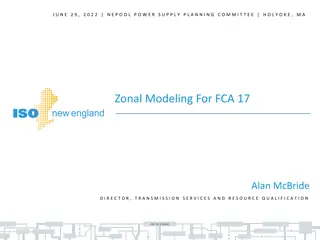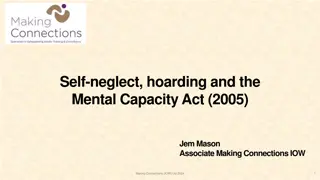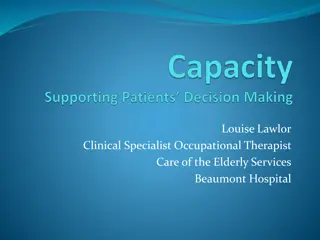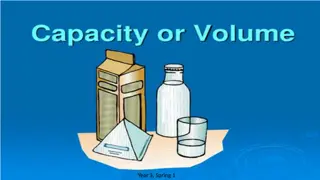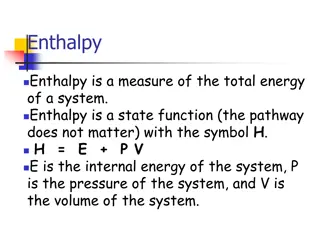Capacity
Ability to make rational decisions is crucial for medical, financial, and placement choices. Evaluating communication, understanding treatment options, appreciating consequences, and decision-making skills are vital components in determining decision-making capacity in patients. The process involves assessing the ability to communicate effectively, understand treatment implications, appreciate outcomes, and make informed decisions. Lack of capacity may be indicated by an inability to decide or frequent changes in decisions, while memory issues do not necessarily signify a lack of capacity. It is essential to focus on the decision-making process rather than solely the outcome.
Download Presentation

Please find below an Image/Link to download the presentation.
The content on the website is provided AS IS for your information and personal use only. It may not be sold, licensed, or shared on other websites without obtaining consent from the author.If you encounter any issues during the download, it is possible that the publisher has removed the file from their server.
You are allowed to download the files provided on this website for personal or commercial use, subject to the condition that they are used lawfully. All files are the property of their respective owners.
The content on the website is provided AS IS for your information and personal use only. It may not be sold, licensed, or shared on other websites without obtaining consent from the author.
E N D
Presentation Transcript
Capacity Nancy Weintraub, MD, FACP Professor of Medicine, UCLA Director, UCLA Geriatric Medicine Fellowship Director, VA Special Advanced Fellowship in Geriatrics at GLA VA
What is Decision Making Capacity? The ability to make rational decisions Can be medical decisions, financial decisions, placement decisions, etc. Decision specific Sliding scale: Decisions with greater potential for harm may require a higher level of capacity
Who Decides? All physicians can judge a patient's capacity to make decisions Psychiatric and neurologic consultation may be helpful Evaluation for patients who speak a language other than English requires an interpreter
How? Ability to communicate Ability to understand the proposed treatment and alternative interventions Ability to appreciate the consequences of accepting or declining the suggested treatment Ability to make a choice and to explain the rationale for their choice
Communicate Need to pursue all possible means to communicate, e.g. Translator Hearing Aides or Pocket Talker Pen and Paper Braille Yes/no questions in person who is intubated
Understand What s wrong? How can we treat it? Tell me the options Tell me the outcomes of each option
Appreciate Acknowledge the problem (possess insight) Manipulate the information Be able to explain the underlying medical (or other) problem and why it occurred Explain why certain courses of treatment are recommended
Make a Decision Inability to decide may indicate lack of capacity Frequent changes of decision may indicate lack of capacity Poor memory does NOT necessarily mean lack of capacity
Ability to explain the Rationale Importance of PROCESS of decision making NOT the decision Patients are allowed to make bad choices
Capacity may be limited by internal and external factors. Capacity may be gained or lost. May require re-evaluation Clinical maneuvers may enhance capacity: Depression -> pharmacologic or talk therapy Delirium -> remove medications, treat disease, timing Somnolence -> remove medications, treat disease Psychosis -> pharmacologic therapy Cultural misconnection -> recognize, consider match
Capacity vs. Competence
Competence and incompetence are legal terms, implying actions of a court of law. Capacity is specific to the medical (or other) decision at hand, decision made by a physician
Capacity to Consent Ability to communicate Ability to understand the proposed treatment and alternative interventions Ability to appreciate the consequences of accepting or declining the suggested treatment Ability to explain the rationale for their choice


















